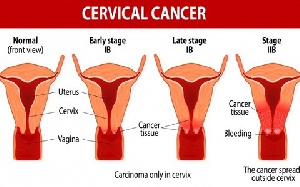There are different types of cervical cancers that begin in the cells lining the cervix (the lower part of the womb that connects the uterus to the birth canal). Nearly all cases are caused by infection with high-risk types of human papillomavirus (HPV).
Pre-cancerous changes can be discovered through a Pap test and treated but in some cases still have the potential to turn into cancer.
Though the cancer is frequently diagnosed in middle-aged women (between 35 and 44), the risk of developing the cancer is still present in younger women and women over age 65.
If the following symptoms appear, it’s likely that the cancer has already become invasive. Ignoring them may allow the cancer to develop to a more advanced stage and lower your chances for effective treatment.
Vaginal bleeding
Whether it’s after intercourse, between periods or after menopause, any abnormal bleeding or spotting should indicate a red flag. You may also experience heavier or longer menstrual periods than usual.
Pelvic pain
If you are experiencing pain in the lowest part of your abdomen and pelvis (especially during intercourse), consult a medical professional. Even if it may not be cancer-related, this symptom can be a result of another reproductive condition.
Unusual discharge
Some vaginal discharge is normal for keeping tissues healthy and protecting against infection and irritation. But if you experience discharge that is watery, bloody or has a foul odor – it could be a sign that something’s wrong.
Difficulty urinating
If you’re experiencing pain, discomfort in urinating or notice any blood in your urine that’s not a result of menstruation, don’t ignore it. Seek professional attention right away.
Loss of weight and appetite
If you have little appetite or are dropping pounds no matter how much food you consume, heed the warning. The disinterest in food could be the result of the cancer itself or even after discovery of the cancer as a result of the treatment.
Health News of Sunday, 4 November 2018
Source: classfmonline.com

















